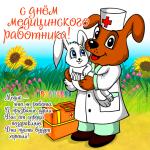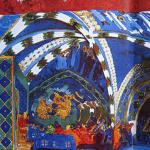May 18, 2016 in the Hall of Church Councils of the Cathedral of Christ the Savior in Moscow His Holiness Patriarch Kirill of Moscow and All Rus' led the sixth ceremony of electing and awarding laureates of the Patriarchal Literary Prize named after saints Equal-to-the-Apostles Cyril and Methodius.
The ceremony was attended by representatives of the Russian Orthodox Church: chairman, first vicar of the Patriarch of Moscow and All Rus' for Moscow, viceroy, chairman of the Publishing Council, executive secretary, viceroy, employees of the Publishing Council and other synodal institutions, clergy and monastics.
The event was also attended by the Chairman of the Moscow City Duma A.V. Shaposhnikov, Deputy Plenipotentiary Representative of the President of the Russian Federation in the Central Federal District M. Zyazikov, Deputy Chairman State Duma RF FS S.V. Zheleznyak, first deputy leader of the faction " United Russia", coordinator of the Inter-factional deputy group of the State Duma of the Federal Assembly of the Russian Federation in defense of Christian values S.A. Popov, Chairman of the Union of Writers of Russia V.N. Ganichev, Advisor to the President of the Russian Federation for Culture V.I. Tolstoy, President V.A. Alekseev, members of the House of Trustees of the Patriarchal Literary Prize, Russian literary scholars, journalists, managers and representatives public organizations, cultural figures.
Before the ceremony began creative meetings some laureates of the Patriarchal Literary Prize of past years with readers.
Event visitors were given special issue magazine of the Publishing Council of the Russian Orthodox Church “Orthodox Book Review”, dedicated to the Patriarchal Literary Prize and the 2016 nominees. The issue contains photographs, biographical information, excerpts from works, interviews, and a selected bibliography of the nominees.
Then elections took place for the laureates of the Patriarchal Literary Prize, which were determined by secret vote of the members. The counting of votes was carried out by the counting commission, which included: A.N. Varlamov, writer, philologist, researcher of the history of Russian literature of the 20th century, laureate of the Patriarchal Literary Prize in 2013; V.A. Voropaev, literary critic, professor at Moscow State University. M.V. Lomonosov; V.N. Nikolaev, writer, laureate of the Great Literary Prize of Russia, laureate of the Patriarchal Literary Prize 2012.
His Holiness the Patriarch presented the laureates with a diploma and badges of the Patriarchal Literary Prize.
The laureates addressed words of gratitude to His Holiness, members of the Prize's House of Trustees and all participants in the ceremony.
All the award nominees were also invited to the stage, and the Primate of the Russian Orthodox Church presented them with certificates and memorable gifts.
His Holiness again addressed those gathered:
“Dear laureates! Dear nominees! Dear participants of the ceremony!
I congratulate all of us on this bright, kind and, as it seems to me, very necessary event for our people.
We noted creative path wonderful authors. Through this award, I hope many people will recognize their names. Therefore my special word gratitude to the award participants - both laureates and nominees.
I would like to wish you dear writers, God's help in your difficult task, so that you always have the strength to burn the hearts of people with a verb, so that you always have the courage to see the truth and, if necessary, fight for the truth. So that you always have enough health, despite your age and external circumstances of life, to fully reveal your abilities for the benefit of the Church and the Fatherland.
Christ is Risen!"
At the end of the evening there was festive concert, which was attended by the winner all-Russian competition“Voice” Hieromonk Photius (Mochalov), choir Valaam Monastery (artistic director A. Zhukov), soloists musical theaters, laureates international competitions vocalists and performers of instrumental music.
Patriarchal literary prize established by the Holy Synod at a meeting on December 25, 2009 (magazine No. 115) with the aim of encouraging writers who have made a significant contribution to the establishment of spiritual and moral values in the life of modern man, family and society, who created highly artistic works that enriched Russian literature. This prize has no analogues in the history of the Russian Orthodox Church and other Local Orthodox Churches.
The first laureate of the Patriarchal Literary Prize in 2011 was the writer Vladimir Krupin. In the second award season (2012), the winners were Olesya Nikolaeva and Viktor Nikolaev. In 2013, Alexey Varlamov, Yuri Loshchits and Stanislav Kunyaev received awards. In the fourth award season (2014), the laureates were Archpriest Nikolai Agafonov, Valentin Kurbatov and Valery Ganichev. In 2015, the prize was awarded to Yuri Bondarev, Yuri Kublanovsky and Alexander Segen.
Press service of the Patriarch of Moscow and All Rus'
The list of nominees for the 2015 Patriarchal Literary Prize includes:
Archpriest Leonid Safronov; Bondarev Yuri Vasilievich; Burlyaev Nikolay Petrovich; Volodikhin Dmitry Mikhailovich; Voropaev Vladimir Alekseevich; Kublanovsky Yuri Mikhailovich; Matveeva Novella Nikolaevna; Segen Alexander Yurievich.
On May 26 at 13:00, a press conference dedicated to the 5th anniversary of the Patriarchal Literary Prize and the award ceremony for this year’s laureates will be held at the International Multimedia Press Center of the Rossiya Segodnya International Information Agency (Zubovsky Boulevard, 4). A video recording of the event will be available via a link on the press center website http://pressmia.ru/pressclub/20150526/950142685.html
On May 28, 2015, in the Hall of Church Councils of the Cathedral of Christ the Savior, His Holiness Patriarch Kirill of Moscow and All Rus' will lead the solemn ceremony of electing and awarding the laureates of the Patriarchal Literary Prize.
On the occasion of the 5th anniversary of the Patriarchal Literary Prize, a jubilee collection of works by writers - laureates and nominees for the 2011–2015 award - is being published. Written in beautiful language, serious and funny, lyrical and filled with warm humor, they will not leave readers indifferent. The book will be of interest to wide range readers.
The Patriarchal Literary Prize named after Saints Cyril and Methodius, Equal-to-the-Apostles, was established by the Holy Synod on the initiative of His Holiness Patriarch Kirill in order to encourage writers who have made a significant contribution to the affirmation of spiritual and moral values in the life of modern man, family and society, who have created highly artistic works that have enriched Russian literature.
The Prize laureates are elected by a vote of members of the House of Trustees from among the nominees who were included in short list awards. Voting takes place at the ceremony of election and awarding the Prize, in the presence of representatives of the media.
The Chairman of the House of Trustees is His Holiness Patriarch Kirill of Moscow and All Rus'; Secretary of the House of Trustees - Chairman of the Publishing Council of the Russian Orthodox Church, Metropolitan of Kaluga and Borovsk Clement. The House of Trustees includes representatives of the Russian Orthodox Church and the literary community, public figures, scientists and cultural figures. Among them: Archbishop Anthony of Borispol, Bishop Benjamin of Borisov, Archpriest Vsevolod Chaplin, Archimandrite Tikhon (Shevkunov), Alexander Arkhangelsky, Alexey Varlamov, Andrey Vasilevsky, Yuri Vyazemsky, Valery Ganichev, Konstantin Kovalev-Sluchevsky, Boris Oleinik, Yuri Polyakov, Alexander Sokolov, Boris Tarasov, Viktor Fedorov, Sergey Chuprinin and others.
The Patriarchal Literary Prize named after Saints Cyril and Methodius, Equal-to-the-Apostles, has no analogues in the history of the Russian Orthodox Church and other local churches. The award ceremony is intended to promote the development of interaction between the Russian Orthodox Church and the literary community. The prize is awarded in the category “For significant contribution to the development of Russian literature.”
The prize is designed to promote the development of interaction between the Russian Orthodox Church and the literary community - first of all, those writers who, with their creativity, affirm the foundations Christian faith. The right to nominate candidates for the award belongs to the Primates of Local Orthodox Churches, heads of self-governing Churches within the Moscow Patriarchate, diocesan bishops of the Russian Orthodox Church, bodies state power CIS and Baltic countries, Synodal institutions of the Russian Orthodox Church, as well as editorial offices of literary magazines and literary and public organizations.
Organization of all events related to the selection of Prize nominees, as well as preparation of meetings of the Chamber of Trustees, Council of Experts and organization Ceremony the election and awarding of the laureate of the Patriarchal Literary Prize is entrusted to the Publishing Council of the Russian Orthodox Church.
The first laureate of the Patriarchal Literary Prize in 2011 was the writer Vladimir Nikolaevich Krupin. In the second award season (2012), the winners were Olesya Aleksandrovna Nikolaeva and Viktor Nikolaevich Nikolaev. In the third award season (2013), the awards were given to Alexey Varlamov, Yuri Loshchits and Stanislav Kunyaev. In the fourth award season (2014), the laureates were: Father Nikolai Agafonov, Valentin Kurbatov and Valery Ganichev.
More detailed information information about the Patriarchal Literary Prize and this year's nominees is available
The winners of the Patriarchal Literary Prize were writers Boris Tarasov, Boris Ekimov and priest Nikolai Blokhin. The awards were presented to the winners in the hall of church councils of the Cathedral of Christ the Savior in Moscow by Patriarch Kirill of Moscow and All Rus'.
“I sincerely hope that the prize will allow us to identify new authors and recognize writers who continue in their work the best traditions Russian literature,” said the patriarch.
About spiritual literature and hack work
He noted that modern man often does not find the opportunity to pay attention to something that does not concern him professional activity or family concerns. By holding this competition, the Church hopes to present highly spiritual literature to Russians, he emphasized.
A total of nine nominees were identified, including writer Ksenia Krivosheina, who withdrew her application without explanation. The short list also included Alexander Gromov, Alexey Karpov, nun Euphemia (Elena Pashchenko), Valery Sergeev, Andrey Tkachev (archpriest). The three laureates were chosen by secret ballot.
At the same time, before the award ceremony, the patriarch criticized the modern tendency of some writers to “cheat.” “Today, sometimes literature becomes simply a means of making money, and texts appear that cannot in any way be called literature, and sometimes they are simply pure hackwork: literary, stylistic, semantic,” the patriarch said.
He noted that he sometimes “has to open such texts for one reason or another.” “It’s embarrassing,” he said.
Patriarch's Prize and laureates
The Patriarchal Literary Prize named after Saints Cyril and Methodius, Equal-to-the-Apostles, has no analogues in the history of the Russian Orthodox Church and in the practice of other local Orthodox Churches.
The prize is awarded not for specific works, but “for a significant contribution to the development of Russian literature.” According to the plan, the competition is designed to develop interaction between the Church and the literary community, which through its creativity affirms the foundations of the Christian faith. The right to nominate candidates for the prize belongs to the primates of local Orthodox Churches, heads of self-governing Churches within the Moscow Patriarchate, diocesan bishops of the Russian Orthodox Church, government bodies of the CIS and Baltic countries, Synodal institutions of the Russian Orthodox Church, as well as the editorial offices of literary magazines and literary and public organizations. Until now, only writers have become laureates of the prize.
The award, which has already become well-known and prestigious, was presented this year for the sixth time. It was founded Holy Synod in 2009 and was awarded for the first time in 2011. Last year, the monetary portion of the prize amounted to 300 thousand rubles per laureate.
The first laureate of the Patriarchal Literary Prize was the writer Vladimir Krupin. In the second premium season, the winners were Olesya Nikolaeva and Viktor Nikolaev, in the third - Alexey Varlamov, Yuri Loschits and Stanislav Kunyaev, in the fourth - Nikolai Agafonov, Valentin Kurbatov and Valery Ganichev, in the fifth - Yuri Bondarev, Alexander Segen and Yuri Kublanovsky.
In September, the Publishing Council of the Russian Orthodox Church opens the seventh season of the Patriarchal Literary Prize. Applications from applicants for this award will be accepted until February 2017. About how modern literature reflects spiritual state person, about connection different eras reflects Metropolitan Kliment of Kaluga and Borovsk, Chairman of the Publishing Council of the Russian Orthodox Church. His article is dedicated to the work of this year's Patriarchal Literary Prize laureates - priest Nikolai Blokhin, prose writer Boris Ekimov, literary critic Boris Tarasov.

In history they highlight different periods. One is called gold, the other, for example, silver or bronze. The secular culture of Russia knows two special eras of its heyday, called the golden and silver age. Obviously, both periods are associated with the desire of society to comprehend the surrounding reality and its tragic experience (be it the war with Napoleon or the Russian revolutions of the early twentieth century), turning to the spiritual potential of the Russian people, to those most important values that were once the basis and still since then define the originality civilizational development Russia. This was reflected in the development philosophical thought, and in various types art, especially in domestic literature.
In the current post-Soviet era, the need for self-identification is also acutely felt, which, in particular, is reflected in the search for national idea, unifying the beginnings for modern Russian society. The Russian Orthodox Church, which has preserved the most important values of Russian civilization for centuries, supports that modern Russian literature that helps find answers to these pressing questions. In this regard, let's try to think about how the modern period of the history of Russian literature differs, considering the creativity latest nominees Patriarchal Literary Prize named after Saints Cyril and Methodius.
Prose writers became its new laureates this year Boris Nikolaevich Tarasov, Boris Petrovich Ekimov And Priest Nikolai Blokhin. These are people different fates, but there is a palpable common component in their work. With a variety of topics and genres of works, all three authors broadcast to the modern reader the eternal norms of Christian ethics, as an active, practical part of the worldview that our people have adopted since the Baptism of Rus' by the holy Equal-to-the-Apostles Prince Vladimir. And another unifying principle is the fact that they all experienced Soviet era when direct and frank presentation religious views and even kind word against the Church was persecuted by the atheist state.
Priest Nikolai Blokhin V Soviet years, while not yet a priest, was arrested and spent several years in prisons and camps for illegal publication and distribution Orthodox literature. It was then, in prison, that he wrote his first story, “Grandma’s Glass.” He even jokes that prison made him a writer. Today he is the author of many books well known to Orthodox readers: “The Deep Mire,” “Give Up Your Brother,” “The Chosen One,” “Paul,” “Frontier,” “The Christmas Tale,” “Vladimirskaya.”
The perception of any sorrows as a source of human rebirth, as a motivating principle for his internal change, runs through the entire work of the author. This leitmotif was internally suffered and understood by priest Nikolai Blokhin from personal life experience. It is no coincidence that he said exactly this in his response at the ceremony of awarding the laureates of the Patriarchal Literary Prize.
The theme of the Christian faith, its acquisition, Baptism as the greatest sacrament and the main event in a person’s life, the choice between faith and its denial, between yielding to sin and fighting it occupies central place in the works of priest Nikolai Blokhin. It is this that is the main core around which other themes, ideas, and characters are located. It is to her that everything in the narrative is subordinated. For example, in the stories “Grandma’s Glasses” and “The Chosen One,” the author depicts how deeply people, including the youngest, very children, changed when they believed and received Baptism, how differently they began to look at the world, at themselves, at those around them. The reader gets the impression that the adult characters are divided primarily on the basis of faith or lack of faith, that this is precisely their defining feature. This is why coming to faith radically changes the adult characters as well.
I have heard that Blokhin’s heroes lack psychologism, which is why they are somewhat schematic and even unreliable. But, in my opinion, most of them are not without the main thing - internal change, as a result of spiritual choice. Lack of subtlety in the story emotional experiences can be explained by the fact that the writer, when creating his characters, sought to focus the reader’s attention on the main thing - to show the responsibility of the person himself for his own choice.
This choice is always alternative: either acceptance of the Savior, the desire to follow Christ, read the Gospel, the lives of the saints, try to follow their example, or unbelief, or even a willingness to communicate with dark forces... According to the author, it is this choice as the focus of spiritual life every person at any age is at the center of the story. He is the main thing that the author wants to tell the reader about, and everything else is secondary, less important. That is why some “schematism” and a lack of “psychologism” in individual images are possible here.
There is an element of fantasy in the books of priest Nikolai Blokhin. It is intertwined with reality, and in the living fabric of his works they cannot be separated.
Often, only children, with their spontaneity, better than anyone else, grasp the essence of what is happening and can express it. In my opinion, the most bright that example - Alyosha from the story “Give me back your brother.” The child, not understanding what the adults intend to do, not knowing at all that what the adults intended (termination of pregnancy) is possible, intuitively senses trouble. Feeling afraid that something is threatening his future brother, he turns to adults (parents and hospital doctors) with the most important request for him: “Give me your brother!” And these words of the child “wake up” the elderly doctor, who thought that over the years of working in such a hospital he had become accustomed to everything. Then he admits that “he hasn’t run like that since the war,” when he found and caught up with Alyosha to tell him that his brother was alive, that he wasn’t killed...
The theme of suffering for faith and readiness for this suffering, the determination to endure it with God's help, but not to retreat, occupies a significant place in the work of Priest Nikolai Blokhin. Here you can remember the teacher Julia, Zoya and Seva-Sevastyan from the story “The Chosen One”.
Of the works of priest Nikolai Blokhin, the most powerful in artistically, in my opinion, is the story “The Deep Mire,” which tells about the events of the times Civil War. Reality in it is intertwined with elements of fantasy, each character has his own story, and it is not immediately and not always clear to the reader why suddenly this particular hero sees a mysterious monastery, a place of salvation for many, when other people do not see it. One of the most important thoughts in this story is the hope for the possibility of repentance, which remains with a person even when it is obvious that he has committed terrible atrocities, and by earthly standards this cannot be forgiven. In this regard, the first thing that comes to mind is the Red Army commander Vzvoev, who also suddenly saw that monastery and even found himself in it.
The writer conveys to the reader the idea of the importance of preserving Orthodoxy by every living generation, despite the obstacles inherent in its time. This is very important not only for us living today, but also for our descendants. Spiritual succession is the essence of the history of our people as a whole and the individual families that make it up, which, like a baton, pass on Orthodox faith and a virtuous life from one generation to another.
This year's laureate Patriarchal Prize writer Boris Petrovich Ekimov- one of the best prose writers not only of our time, but, as it seems to me, of all Russian literature. His works are written in the highest artistic level. This is exemplary (so to speak) prose, created in the best traditions Russian literature. I remember how many years ago I first read Boris Petrovich’s stories, and they made a very special, unforgettable impression on me.
Each period of the country's history is reflected in its own way in its secular culture. Various works arts: painting, music and literary works and the like - are the most valuable and detailed evidence of the era in which they were created. To a large extent, it is from them that descendants can judge the period as a whole, the development of culture and society, and what worried the people who lived then. Someday our descendants will judge our time by cultural heritage of our era, including literary works contemporary authors. I think that among the best, worthy prose works The books of Boris Petrovich Ekimov will remain in history.
Most of his works on the subject can be attributed to village prose . But they all tell not only about the villagers, they are about all people. Love to small homeland, beauty native nature, habit and craving for rural work, for one’s land, joys, sorrows, worries, relationships between relatives and fellow villagers - all this is in the works of B.P. Ekimova. One of his collections (“Return”) has the subtitle “Stories about Living Life.” Exactly this precise definition the essence of all the writer’s prose.
There are many themes in his works, they are intertwined with each other into a complex artistic whole, they cannot be divided into components or separated from each other. When asked what, for example, one of the best stories in all Russian literature, “The Shepherd’s Star,” is about, it is impossible to give a monosyllabic answer. It is better to advise you to read it.
The novels and stories of Boris Ekimov are permeated Christian spirit, including those in which there is no direct mention of Christian realities. Let me again remember “The Shepherd Star” and its main character Timofey, for whom the moral principle “thou shalt not steal” is so natural that it does not even occur to him that he can appropriate other people’s sheep. At first he cannot even think that this is exactly what the owner who hired him as a shepherd intended. Timofey himself does not take what belongs to others.
“I don’t even need someone else’s,” he removed the money. - No matter how many times I passed, thank God I wasn’t flattered. But what about... People are crying somewhere, and we will crow with happiness, - he said weakly, but still hoping to convince . “You can’t thrive on other people’s tears.”
The whole image of the village simpleton, in which the greatness of the Russian spirit is focused, appears before the reader in the same lively, uncontrived, whole way. Timofey is truly responsible for his work, remembers the advice of the old shepherd, from whom he himself once learned. He lives in full force only in his small homeland, near his native farm, where he is surrounded by nature that is close to his heart, so familiar and at the same time the most beautiful.
But for all his simplicity, Timothy has wisdom. He is not offended by the owner's teenage son, who at first behaves somewhat arrogantly. Over time, Timofey becomes a truly close person to this boy. Unobtrusively, he convinces the teenager that it is impossible to spoil the growing bread. You cannot let a herd into the field, because even if the authorities are ready to turn a blind eye to this, a person should not act against his conscience:
“Don’t waste your bread. Poisoning bread is a great sin.”
The story “The Mistress” clearly illustrates how yielding to one sin leads to a whole chain of subsequent ones. main character Olga is widowed and wants to find her happiness with Mikhail, a childhood friend who has long had a wife and children. Dreaming of destroying someone else's family and life together with someone else's husband, Olga goes further and further along the path of untruth, hardening her heart. She kicks the mother of her deceased husband out of the house in which she lived all her life, despite the fact that her mother-in-law always helped her raise her daughters and took on the hardest work. Olga forces her to move to another village to live with her daughter, where she is not very welcome, and then refuses to take her back. When old woman asks with tears to let her spend her last earth years in this house, Olga emphasizes that now they are strangers. All the injustice and callousness of Olga’s persistent desire to remain the only mistress in the house is revealed by her relationship with her own daughter Rosa, who insists that grandmother Akulina (“Baba Kulya”) live with them. After all, for her, “babanechka” is the dearest and most beloved person.
The story “Talk, Mom, Speak...” is about complete mutual understanding and true love between a long time ago adult daughter and mother. Both are able to feel from a distance what is especially important to a loved one, and give him exactly that. Both know, remember and take care of what their loved one loves and values.
Even if these works do not directly talk about Christianity, such was the era, but moral values are spelled out everywhere in them.
The 2016 Patriarchal Prize laureates included Boris Nikolaevich Tarasov- writer, philosopher, literary critic, doctor philological sciences, Professor Literary Institute named after M. Gorky, who headed it as rector for many years, Honored Scientist of the Russian Federation.
In the series "Life" wonderful people“Boris Nikolaevich Tarasov published two books. This fictional biographies Christian thinkers Pascal and Chaadaev. I believe that most readers appreciate this probably oldest book series, which dates back to 1890. It was from this time that the publishing house F.F. Pavlenkov began to publish biographical and artistic-biographical books under a general title. Later, in the 30s of the 20th century, the series was resumed by Maxim Gorky.
Both books by Boris Tarasov are in demand by readers and have been reprinted several times. The wide readership, in my opinion, knows both thinkers somewhat “one-sidedly”: one as a scientist, the other as a contemporary of Pushkin, the addressee of his lines, a man whom the government declared crazy for his writings. Other aspects of their activities remain as if in the shadows. Meanwhile, Chaadaev himself considered himself a Christian thinker. In the books of B.N. Tarasova B. Pascal and P.Ya. Chaadaevs are revealed as versatile, deep personalities. Boris Nikolaevich has done a tremendous amount of work. He studied and analyzed many sources, resulting in his books that were very informative and entertaining.
In addition to those mentioned biographical works Boris Tarasov published whole line educational books (“In the world of man”, “Where history is moving”, “Historiosophy of F.I. Tyutchev in the modern context”, “Man and history in Russian religious philosophy and classical literature", "The Mystery of Man" and the Mystery of History (unread Chaadaev, unheard Dostoevsky, unidentified Tyutchev)", "Dostoevsky and modern world”, etc. He also prepared a two-volume book “Nicholas the First and His Time” and a one-volume book “Knight of the Autocracy”), the titles of which indicate the author’s constant interest in the history of Russian literature and its connections with religious philosophy.
I would like to particularly focus on the book by B.N. Tarasov “Where is history moving (Metamorphoses of people and ideas in the light Christian tradition)". In it, the author consistently pursues a relevant idea: when they try to replace Christian values with some other values, even the most seemingly good, humane, humane ones, nothing truly good and bright comes out as a result. All attempts to replace Christian values, Christian norms, Christian views with any others, supposedly aimed at the benefit of individuals and all humanity, which have been made more than once in history and are being undertaken in our time, do not lead to anything good. If the basis is not laid Christian hierarchy values, if these values are distorted, then everything done on such a foundation most often turns out to be evil for humans and the surrounding world, although, as it seemed, those who tried to build on such a foundation were pursuing good goals.
In the book by B.N. Tarasov “Where History is Moving” we're talking about about famous domestic writers, philosophers and political figures of the XIX century (Emperors Alexander I and Nicholas I, Westerners, Slavophiles, soilists, F.I. Tyutchev, A.S. Pushkin, P.Ya. Chaadaev, K.N. Leontyev, L.N. Tolstoy) and about their contemporaries. Exploring their heritage in the most various aspects: cultural, literary, philosophical, social - the author analyzes the problems they faced and ways to solve them in the complex context of Russian and world history.
At first glance it may seem that XIX century fairly well studied and largely known to most people. Domestic and world history of this century, as well as the classics of Russian literature in our country are studied at a school desk. This period of history is widely represented in research, popular science and fiction. But it should be noted that ideas about it in our society are, as a rule, superficial, insufficient and, importantly, contain a significant number of cliches.
The special value of the works of B.N. Tarasov is that he consistently, on a strictly scientific basis, destroys many templates. One of the most bright examples— attitude towards Emperor Nicholas I, assessment of his personality and the period of his reign. From a school history course, most students learn that this was an era of reaction, stagnation in all areas of life, and the emperor himself is perceived by them as a strangler of all freedom, an “offender” best poets, writers and generally thinking people - like “Nikolai Palkin”. Opposing this cliché, Boris Nikolaevich Tarasov convincingly shows that the figure of the emperor was not so clearly gloomy, and the years of his reign cannot be characterized only as a time of complete darkness in all life spheres. The researcher gives many examples from the life and activities of the emperor, which convince the reader that Nicholas I had a lot positive qualities, important and necessary for governing the state, and his deeds for the benefit of the country are numerous and undeservedly forgotten.
I consider it very valuable that B.N. Tarasov does not go to the other extreme, maintaining a critical assessment historical figures. It happens that authors who write about someone undeservedly forgotten or who has received an undeserved “dark halo” in history become too carried away with apologetics and create in their works an unrealistically positive, to some extent “inanimate” image. In the studies of B.N. Tarasova is preserved historical truth, heroes remain real people having both advantages and disadvantages. The author does not idealize the actions of the heroes of his books, does not present them in a “favorable” light, and does not select justifications for any of their actions. He recognizes not all the thoughts and actions of those he writes about as true.
Thanks to the works of B.N. Tarasov presents the reader with a much more real, versatile 19th century with all its contradictions, with many interesting and important people who lived at that time. The author does not just list facts and write about emperors, writers, philosophers, he gives the reader the opportunity to comprehend historical and cultural patterns and the significance of Christian values, norms, and traditions in history.
In conclusion, it should be noted that the laureates of this year’s Patriarchal Literary Prize in their own way reflect the diversity modern literature, rooted in the Orthodox worldview. Years of atheist censorship in national culture haven't weakened creative potential writers who broadcast Orthodox moral principles and beliefs. And today we need more such writers. I don’t know what the contemporary period of Russian literature will be called. But its distinctive feature, in my opinion, is the interest of many talented authors in the spiritual laws of existence and their manifestation in the realities of our time.
The prize winners were Boris Tarasov, Boris Ekimov and Priest Nikolai Blokhin
Text: Tatyana Vladykina/RG
Photo: Arkady Kolybalov/RG
On May 18, at the Cathedral of Christ the Savior, the laureates of the Patriarchal Literary Prize named after Saints Cyril and Methodius, Equal-to-the-Apostles, were awarded. The winners were Boris Tarasov, Boris Ekimov and Priest Nikolai Blokhin.
I hope that the prize will allow us to identify new authors and recognize writers who continue the best traditions of Russian literature in their work,” the Patriarch said, summing up the results of the competition. Before the award ceremony, His Holiness criticized some.
Today, sometimes literature becomes simply a means of making money, and texts appear that cannot in any way be called literature, and sometimes they are simply pure hackwork: literary, stylistic, semantic,” said the Primate of the Russian Orthodox Church. He admitted that such texts make him feel ashamed.
In this feeling, he is supported by the majority of previous laureates, meetings with whom took place on the eve of the ceremony. One of them, writer Alexey Varlamov, told RG about what the prize is given for and what is special about it.
The award is not given for separate work, but for the writer’s total contribution to , says the writer. — In my opinion, this prize is important for its desire to reunite form and content, to reunite meaning and style. With its value-based approach to literature, to the statement human dignity, to the affirmation of goodness, mercy, in general, everything that we rely on, thanks to which we exist, which Russian literature has always defended. At the same time, it is necessary that this be said not declaratively, not verbosely, in good Russian language, with taste, with that degree of intonation penetration when the writing profession and craft do not contradict good intentions, so that these good intentions were supported by literary skill. The situation is remarkable in that today a lot of books are published by church publishing houses. The church has something that, unfortunately, has been lost in the secular system of books - a fairly well-established book distribution system. In church shops along with literature religious content, with holy scripture, prayer books, literature on church history, both classical and modern are for sale. And, of course, this literature is of a certain kind and variety. I think that being on the short list of the Patriarchal Literary Prize can serve as admission to a church-going reader.
HELP "RG"
The Patriarchal Literary Prize was established by the Holy Synod in 2009. It was first awarded in 2011, the first laureate was the writer Vladimir Krupin. IN different years The winners were Olesya Nikolaeva, Viktor Nikolaev, Alexey Varlamov, Yuri Loshchits, Stanislav Kunyaev, father Nikolai Agafonov. Last year the winners were Yuri Bondarev, Alexander Segen and Yuri Kublanovsky.





